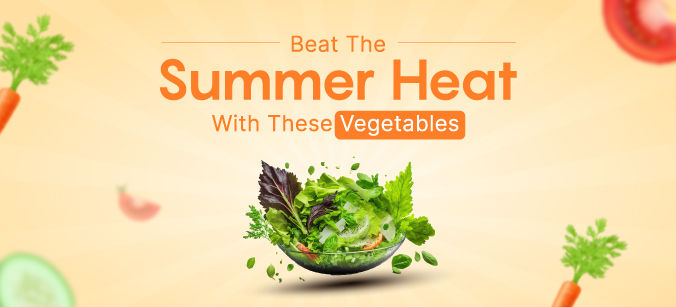General Health
7 Nutrient-Rich Summer Vegetables To Beat The Heat
4 min read
By Apollo 24|7, Published on - 24 April 2023, Updated on - 07 August 2024
Share this article
0
0 like

The scorching heat and the rising temperatures during summer can be tough on your body. While you may feel tempted to eat an ice cream or drink soda to cool off, incorporating nutrient-rich summer vegetables in your diet can benefit your body in the long run. Veggies such as okra, bottle gourd and spinach are packed with essential nutrients that help regulate body temperature during the hot weather. Here are some of the best vegetables to eat during summer:
1. Cucumbers
Cucumbers are an ideal choice to stay hydrated during the hot summer days. It is one of the highly refreshing summer vegetables with approximately 96% water content can be included in salads or blended into cool drinks to maintain optimal hydration levels. Furthermore, cucumbers are highly suitable for weight management as they are low in calories and contain high amounts of dietary fibre. The nutritional profile of this vegetable includes essential vitamins and minerals such as vitamin C, magnesium, and potassium.
2. Lauki (Bottle Gourd)
Bottle gourd, commonly referred to as Lauki or Calabash, has numerous health benefits. This is one of the vegetables to eat in summer that can be prepared either in a dry or curry form and is best relished with chapatis. Its abundant water content helps to maintain the body's hydration levels and supports a healthy digestive system. Moreover, bottle gourd is also one of the high nutrient vegetables that contain vital vitamins and minerals like vitamin C, zinc, magnesium, and potassium which help in maintaining the immune system activity, managing blood pressure, and reducing inflammation.
To know what your vitamin and magnesium levels are, book Vitamin Check
3. Zucchini
Zucchini, also known as turee, is another one of the multipurpose summer vegetables in India that can be incorporated into several delightful summer dishes. Its low-calorie and high-fibre properties make it an excellent option for weight management. Additionally, zucchini contains an abundance of potassium, which regulates blood pressure and prevents muscle cramps. With its high water content, this vegetable can keep the body cool and hydrated throughout the sweltering summer.
4. Parval (Pointed Gourd)
Parval, also referred to as pointed gourd, is one of the highly nutritious summer vegetables in India. It is relished by many when cooked dry or combined with potato and served alongside chapati. This vegetable exhibits anti-ageing characteristics and protects against frequent colds and infections due to its high vitamin C and A levels. Furthermore, parval can reduce cholesterol levels and contains very few calories.
5. Tomatoes
Tomatoes are one of the valuable summer vegetables that can provide substantial benefits in safeguarding the skin from sun damage. Lycopene, a carotenoid found in tomatoes, protects your skin against both UVA & UVB rays and reduces the chances of experiencing a sunburn. Tomatoes are abundant in vitamin C, which reinforces the immune system and aids in fending off infections. Moreover, their low-calorie and high-water content make them exceptional for boosting hydration levels.
6. Bhindi
Bhindi, also referred to as okra or lady's finger, is a renowned summertime vegetable. This vegetable is an excellent source of essential nutrients such as vitamin C, folate, and potassium. It significantly aids in maintaining a healthy digestive system, as it is enriched with fibre, thereby preventing constipation. The low glycaemic index of okra regulates blood sugar levels, and the antioxidants safeguard the body against free radicals, which can otherwise cause cell damage and several illnesses.
7. Spinach
Spinach is one of the high nutrient vegetables which will be an excellent addition to any summer diet. This leafy green is low in calories but high in nutrients like vitamins A and C, iron, and folate, which can help regulate blood pressure, support healthy digestion, and boost the immune system. It also has a high water content, which helps keep the body hydrated during the hot summer months. Spinach can be easily incorporated into a variety of summer dishes, including salads, smoothies, and pasta dishes.
Apart from these, you can also consider several other vegetables to eat in summer that can help you beat the heat during the summer season. These include eggplant, corn, beans, and peppers. Incorporating these seasonal vegetables into your summer meals may help keep your body cool and hydrated and provide various nutrients. So, experiment with these vegetables, and create mouth-watering recipes, while reaping their benefits.
General Health
Consult Top General Physician Kavaches
View AllLeave Comment
Recommended for you
_23.jpg?tr=q-80)
General Health
I got an ultrasound of my liver and the result came out to be Hepatomegaly with fatty liver(Grade 2). My doctor prescribed a few medicines for treatment. But online it says stop taking medicines as it can also affect the liver. Need help.

General Health
Losing Hair In Patches? It Can Be This Disease!
Alopecia areata is not curable but the resulting hair falls can be treated. Read our blog to understand the ways to cope with resulting hair fall.

General Health
When Should You See a Sports Medicine Doctor About Your Pain?
Learn about the signs to look out for and when to seek a sports medicine doctor’s consultation
Subscribe
Sign up for our free Health Library Daily Newsletter
Get doctor-approved health tips, news, and more.
Visual Stories

Plant-based Foods That Are a Great Source of Iron
Tap to continue exploring
Recommended for you
_23.jpg?tr=q-80)
General Health
I got an ultrasound of my liver and the result came out to be Hepatomegaly with fatty liver(Grade 2). My doctor prescribed a few medicines for treatment. But online it says stop taking medicines as it can also affect the liver. Need help.

General Health
Losing Hair In Patches? It Can Be This Disease!
Alopecia areata is not curable but the resulting hair falls can be treated. Read our blog to understand the ways to cope with resulting hair fall.

General Health
When Should You See a Sports Medicine Doctor About Your Pain?
Learn about the signs to look out for and when to seek a sports medicine doctor’s consultation


